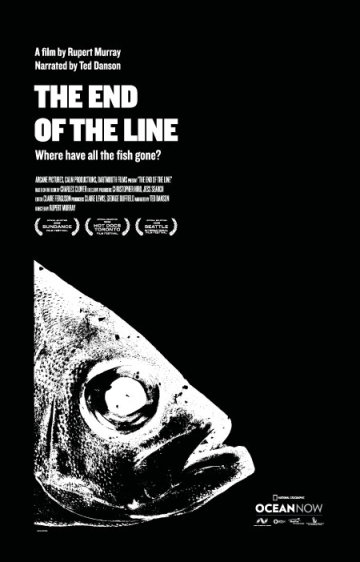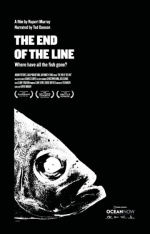End of the Line
“A chilling exploration of how our love affair with seafood is devastating the world's oceans while pushing species after species to extinction.”
The End of the Line
“The inconvenient truth about the impact of overfishing on the world’s oceans” ~ The Economist.
—
Fresh from its world premiere at the 2009 Sundance Film Festival, THE END OF THE LINE is the first major documentary about the imminent peril facing the world’s oceans.
Endorsed by and with major marketing support from National Geographic, Greenpeace, and the Natural Resources Defense Fund (NRDC), THE END OF THE LINE is the definitive film of 2009 for those who care about the environment, the safety of our food supply, and the preservation of endangered species. In short, the issues that confront all of us.
Sound the global alarm. Scientists predict that if we continue fishing at the current rate, the planet will run out of seafood by 2048 with catastrophic consequences. Based on the book by Charles Clover, The End of the Line explores the devastating effect that overfishing is having on fish stocks and the health of our oceans. With Clover as his guide, Sundance veteran Rupert Murray (Unknown White Male) crisscrosses the globe, examining what is causing the dilemma and what can be done to solve it. Murray interweaves glorious footage from both underwater and above with shocking scientific testimony to paint a vivid and alarming profile of the state of the sea. The ultimate power of The End of the Line is that it moves beyond doomsday rhetoric to proffer real solutions. Chillingly topical, The End of the Line drives home the message: the clock is ticking, and the time to act is now. — from the Sundance 2009 Film Festival catalogue
Imagine an ocean without fish. Imagine your meals without seafood. Imagine the global consequences. This is the future if we do not stop, think and act.
The End of the Line, the first major feature documentary film revealing the impact of overfishing on our oceans, we see firsthand the effects of our global love affair with fish as food.
The film examines the imminent extinction of bluefin tuna, brought on by increasing western demand for sushi; the impact on marine life resulting in huge overpopulation of jellyfish; and
the profound implications of a future world with no fish that would bring certain mass starvation. Filmed over two years, The End of the Line follows the indefatigable investigative reporter Charles Clover as he confronts politicians and celebrity restaurateurs, who exhibit little regard for the damage they are doing to the oceans. One of his allies is the former tuna farmer turned whistleblower Roberto Mielgo – on the trail of those destroying the world’s magnificent nbluefin tuna population. Filmed across the world – from the Straits of Gibraltar to the coasts of Senegal and Alaska to the Tokyo fish market – featuring top scientists, indigenous fishermen and fisheries enforcement officials, The End of the Line is a wake-up call to the world.
Scientists predict that if we continue fishing as we are now, we will see the end of most seafood by 2048. The End of the Line chronicles how demand for cod off the coast of Newfoundland in the early 1990s led to the decimation of the most abundant cod population in the world, how hi-tech fishing vessels leave no escape routes for fish populations and how farmed fish as a solution is a myth.
The film lays the responsibility squarely on consumers who innocently buy endangered fish, politicians who ignore the advice and pleas of scientists, fishermen who break quotas and fish illegally and the global fishing industry that is slow to react to an impending disaster.
The End of the Line points to solutions that are simple and doable, but political will and activism are crucial to solve this international problem. We need to control fishing by reducing the number of fishing boats across the world, protect large areas of the ocean through a network of marine reserves off limits to fishing, and educate consumers that they have a choice by purchasing fish from independently certified sustainable fisheries.
“Fascinating in its thesis…an urgent plea for human cooperation, it works a treat.” - Mike Goodridge, Screen International
“Well-researched and persuasively argued…reminder of the fragility of the environment and the consequences of human greed...lush underwater imagery and sharp presentation...Expansive pic generously samples locations from Newfoundland…to the Straits of Gibraltar…and urges like-minded viewers to "claim back the ocean" via eminently sensible measures” - Justin Chang, Variety
—
Fresh from its world premiere at the 2009 Sundance Film Festival, THE END OF THE LINE is the first major documentary about the imminent peril facing the world’s oceans.
Endorsed by and with major marketing support from National Geographic, Greenpeace, and the Natural Resources Defense Fund (NRDC), THE END OF THE LINE is the definitive film of 2009 for those who care about the environment, the safety of our food supply, and the preservation of endangered species. In short, the issues that confront all of us.
Sound the global alarm. Scientists predict that if we continue fishing at the current rate, the planet will run out of seafood by 2048 with catastrophic consequences. Based on the book by Charles Clover, The End of the Line explores the devastating effect that overfishing is having on fish stocks and the health of our oceans. With Clover as his guide, Sundance veteran Rupert Murray (Unknown White Male) crisscrosses the globe, examining what is causing the dilemma and what can be done to solve it. Murray interweaves glorious footage from both underwater and above with shocking scientific testimony to paint a vivid and alarming profile of the state of the sea. The ultimate power of The End of the Line is that it moves beyond doomsday rhetoric to proffer real solutions. Chillingly topical, The End of the Line drives home the message: the clock is ticking, and the time to act is now. — from the Sundance 2009 Film Festival catalogue
Imagine an ocean without fish. Imagine your meals without seafood. Imagine the global consequences. This is the future if we do not stop, think and act.
The End of the Line, the first major feature documentary film revealing the impact of overfishing on our oceans, we see firsthand the effects of our global love affair with fish as food.
The film examines the imminent extinction of bluefin tuna, brought on by increasing western demand for sushi; the impact on marine life resulting in huge overpopulation of jellyfish; and
the profound implications of a future world with no fish that would bring certain mass starvation. Filmed over two years, The End of the Line follows the indefatigable investigative reporter Charles Clover as he confronts politicians and celebrity restaurateurs, who exhibit little regard for the damage they are doing to the oceans. One of his allies is the former tuna farmer turned whistleblower Roberto Mielgo – on the trail of those destroying the world’s magnificent nbluefin tuna population. Filmed across the world – from the Straits of Gibraltar to the coasts of Senegal and Alaska to the Tokyo fish market – featuring top scientists, indigenous fishermen and fisheries enforcement officials, The End of the Line is a wake-up call to the world.
Scientists predict that if we continue fishing as we are now, we will see the end of most seafood by 2048. The End of the Line chronicles how demand for cod off the coast of Newfoundland in the early 1990s led to the decimation of the most abundant cod population in the world, how hi-tech fishing vessels leave no escape routes for fish populations and how farmed fish as a solution is a myth.
The film lays the responsibility squarely on consumers who innocently buy endangered fish, politicians who ignore the advice and pleas of scientists, fishermen who break quotas and fish illegally and the global fishing industry that is slow to react to an impending disaster.
The End of the Line points to solutions that are simple and doable, but political will and activism are crucial to solve this international problem. We need to control fishing by reducing the number of fishing boats across the world, protect large areas of the ocean through a network of marine reserves off limits to fishing, and educate consumers that they have a choice by purchasing fish from independently certified sustainable fisheries.
“Fascinating in its thesis…an urgent plea for human cooperation, it works a treat.” - Mike Goodridge, Screen International
“Well-researched and persuasively argued…reminder of the fragility of the environment and the consequences of human greed...lush underwater imagery and sharp presentation...Expansive pic generously samples locations from Newfoundland…to the Straits of Gibraltar…and urges like-minded viewers to "claim back the ocean" via eminently sensible measures” - Justin Chang, Variety
Played at
Monica Film Center 6.27.09 - 7.05.09
The End of the Line Get Tickets
There are currently no showtimes for this film. Please check back soon.

